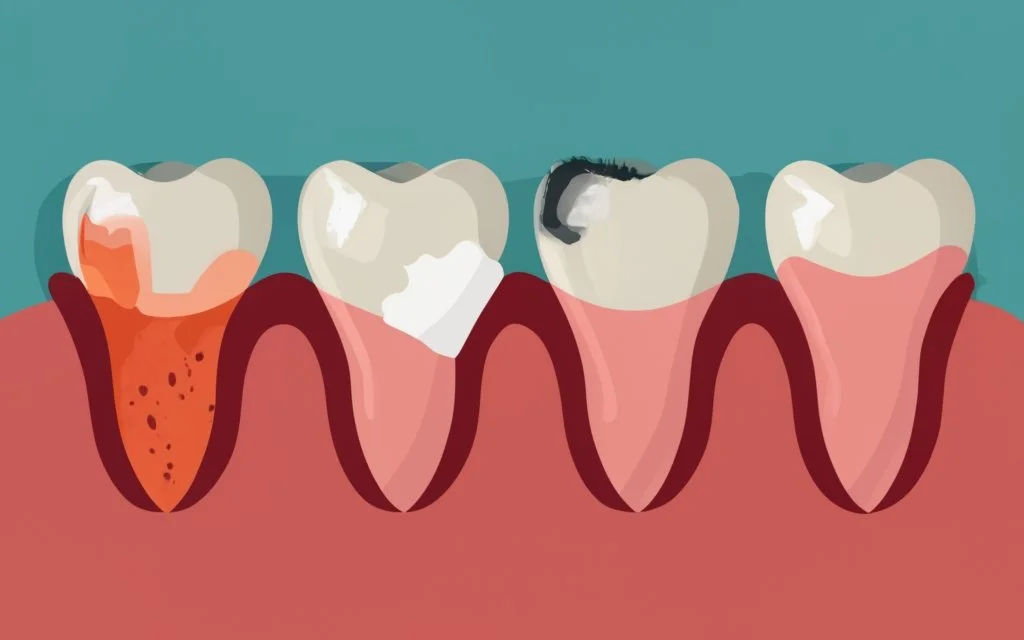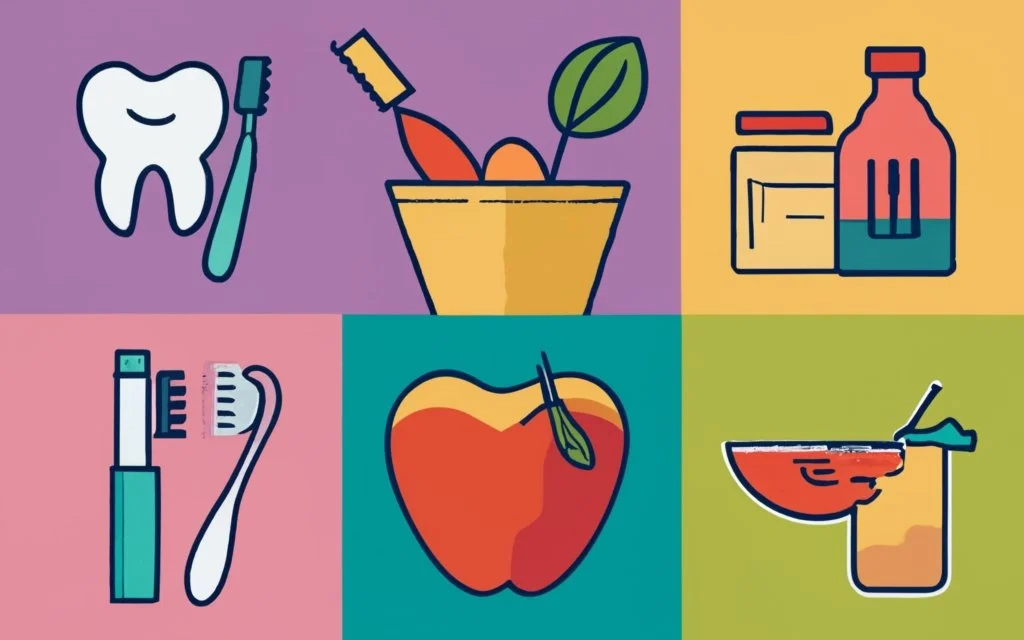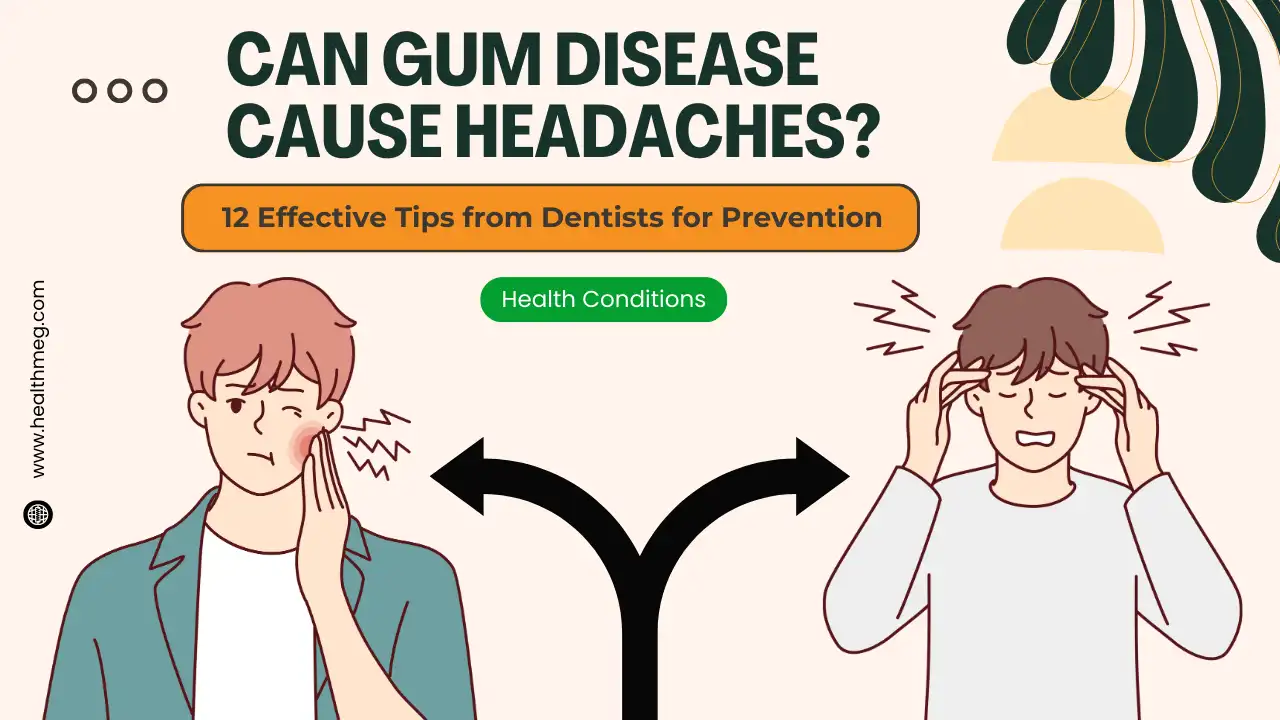Introduction
In this article, we will explore effective methods for “How to cure gum disease without a dentist”. Periodontitis, another name for gum disease, is a common dental condition that can be extremely painful and uncomfortable. It is caused by the accumulation of bacteria and plaque on the teeth, which can cause gum irritation and infection. While visiting a dentist for expert assistance is always advised, there are home cures for gum disease that are natural.
Do Read the People Also Ask (FAQs) about this topic.
Key Takeaways
- To effectively treat gum disease without a dentist, maintain good oral hygiene through regular brushing and flossing, use natural remedies like saltwater rinses and tea tree oil, adopt a healthy diet, and avoid smoking. However, professional dental care is crucial for advanced stages. Early detection and consistent home care can prevent gum disease complications.
- If left untreated, gum disease is a risky problem that can cause teeth loss.
- Gum disease can be prevented and treated with good oral hygiene and natural therapies.
- For the prevention and remedy of gum ailment, ordinary dental exams and cleanings are critical.
Before moving forward, You should know what is a gum disease. It’s really important to know about gum disease before knowing its causes and prevention because if you don’t know the problem, then you cannot have the solution.
What is a Gum Disease?
Gum disease also known as periodontal disease is an infection of the tissues that support your teeth. Poor brushing and flossing practices frequently contribute to it by allowing plaque, a sticky film of germs, to accumulate on the teeth and harden. Gingivitis, a type of gum disease that is often identified by gums that appear red, swollen, and bleed easily is commonly seen as the stage of gum disease. Gum disease can cause major consequences, such as tooth loss and bone damage if not treated.
Types of Gum Disease
The gums and tissues supporting the teeth are both impacted by gum disease, also known as periodontal disease. Gum disease mainly consists of two types:
- Gingivitis
- Periodontitis
Gingivitis
When plaque is formed on the teeth, it causes a milder (less severe) form of gum disease known as gingivitis. After eating food or drinking, a sticky film of bacteria forms on teeth and gums known as plaque that can inflame the gums which is a common dental problem. Bad breath and red, swollen, and bleeding gums are signs of gingivitis.
Fortunately, gingivitis can be reversed with proper oral hygiene. This includes brushing twice a day, flossing daily, and using an antiseptic mouthwash. Additionally, routine dental cleanings can remove plaque buildup on teeth and stop gingivitis from developing into periodontitis.
Periodontitis
The bone and tissues that support the teeth are destroyed in periodontitis, the most serious type of gum disease. Gum recession, loose teeth, and changes in how the teeth bite together are all signs of periodontitis.
Treatment for periodontitis typically involves a deep cleaning procedure called scaling and root planing. To encourage healing, this entails cleaning the root surfaces of the teeth of plaque and tartar. Surgery might be required in more severe situations to fix the harm that periodontitis has done.
It is crucial to remember that gum disease if left untreated, can cause major health issues. Gum disease has also been related to diabetes, heart disease, and stroke in addition to tooth loss. Thus, it’s critical to practice proper oral hygiene practices and seek medical attention if you think you could have gum disease.
Understanding Gum Disease

Millions of individuals all around the world suffer from gum disease, sometimes referred to as periodontal disease. Plaque, a sticky film that accumulates on the teeth and gum line, is brought on by bacteria in the mouth. Gum disease can cause major consequences, such as tooth loss and bone damage if it is not treated.
Gingivitis, a type of gum disease that is often identified by gums that appear red, swollen, and bleed easily is commonly seen as the stage of gum disease. With good oral hygiene and routine dental exams, the illness can be reversed at this point. Periodontitis, a more serious form of gum disease that can permanently harm the gums and bones supporting the teeth, can develop from gingivitis if it is not treated.
To prevent gum disease, it’s crucial to practice good oral hygiene habits because the bacteria that cause gum disease flourish in a warm, wet environment. Plaque can be removed and harmful germs can be kept from growing by brushing and flossing often. Additionally, maintaining a balanced diet and abstaining from cigarette usage can help lower the incidence of gum disease.
It is significant to highlight that certain persons may be more prone to gum disease due to genetic factors or underlying medical issues. Before gum disease develops into more serious issues, regular dental checkups can help detect and treat it in its earliest stages.
Causes and Symptoms of Gum Disease
Gum disease, also known as periodontal disease, impacts both the gums and the bone supporting the teeth. The root causes of gum disease are inflammation of the gums and bacterial infection. If unchecked, gum disease can result in major health issues and tooth loss. While professional dental care is crucial, you might wonder how to treat gum disease without a dentist. Home remedies and good oral hygiene can play a role in managing the early stages of gum disease.
Causes
The first and foremost cause of gum disease is the building of plaque on the teeth and gums. After eating food or drinking, a sticky film of bacteria forms on teeth and gums known as plaque. If not removed by regular brushing and flossing, plaque can harden into tartar, which can only be removed by a dental professional.
The various causes of gum disease are as follows:
- Smoking or using tobacco products
- Poor oral hygiene
- Hormonal changes in women (such as during pregnancy)
- Certain medications that reduce saliva flow
- Genetics
Symptoms
Depending on how severe the problem is, gum disease may show a variety of symptoms. A few typical symptoms (indications) of gum disease include:
- Red, swollen, or tender gums
- Bleeding gums during brushing or flossing
- Receding gums
- Loose or shifting teeth
- Persistent bad breath
- Pus between teeth and gums
- Changes in the way teeth fit together when biting or chewing
You should consult a dental expert right away for an assessment and treatment if you face any of these symptoms. Early gum disease detection and treatment can stop the condition’s progression and related problems.
Does Tooth Pain Cause Gum Disease?
Gum disease (periodontitis) is not directly caused by tooth pain. There is a connection between the two, though, and serious tooth pain can do so in the following ways:
- Poor Oral Hygiene
- Neglected dental care
- Compromised Gum Health
Detailed brief for each is provided below:-
- Poor Oral Hygiene: When someone is suffering from toothache (tooth pain), it is not easy to brush or floss i.e. it could make brushing and flossing uncomfortable or sensitive. This irritation may make people less likely to practise good dental hygiene, such as routine brushing and flossing. Gum disease is significantly affected by poor oral hygiene.
- Neglected dental care: Tooth pain can sometimes be a sign of a hidden dental problem, such as abscess or tooth decay. These disorders can worsen and grow if ignored, potentially developing into gum disease and gum issues.
- Compromised Gum Health: In some circumstances, gum problems like gingivitis (early-stage gum disease) or periodontitis (advanced gum disease) may be the cause of tooth pain. Gum pain, swelling, and bleeding are all symptoms of gum disease. Gum disease can cause tooth pain and tooth loss if it is not treated.
There are many important quick and effective solutions for killing tooth pain nerve permanently before it results in gum disease.
In conclusion, tooth pain does not cause gum disease by itself, but it could worsen gum disease that already exists if it results in poor oral hygiene habits or avoidance of dental treatment. To avoid any potential issues with gum health, it is crucial to treat tooth pain quickly and seek dental care. Gum disease and tooth pain can both be prevented by practising good oral hygiene and getting frequent dental checkups.
There are also chances of having gum disease due to headaches. To know more about it click on this link – Can Gum Disease Cause Headaches?
11 Natural Remedies On How to Cure Gum Disease Without a Dentist

Natural remedies (home remedies) that can be used to cure gum disease at home without a dentist are as follows:-
- Saltwater Rinse
- Swish the Oil Around Your Mouth (oil pulling)
- Tea Tree Oil
- Turmeric Gel
- Aloe Vera
- Green Tea
- Cranberry Juice
- Vitamin-C Rich Foods
- Fruits and vegetables
- Hydrogen Peroxide Rinse
- Maintain Good Oral Hygiene
Home remedies on how to cure gum disease without dentist at home. These treatments can be used in addition to routine brushing and flossing to support healthy gums. You can try the following natural treatments:
- Saltwater Rinse: Because it is a natural disinfectant, Warm saltwater gargles can assist in reducing inflammation and destroy bacteria. Add 1/2 teaspoon of salt to a cup of warm water to treat gum disease with salt water. Spend 30 to 60 seconds gargling with the solution before spitting it out. You should repeat this method several times a day.
- Swish the Oil Around Your Mouth (oil pulling): An old custom that has been utilized for ages to maintain oral health is swishing oil about your mouth. Swish a tablespoon of coconut oil or sesame oil around your lips for 15 to 20 minutes to utilize this cure. Rinse your mouth with water after spitting out the oil. you should repeat this technique once a day.
- Tea Tree Oil: Tea tree oil works well to treat gum disease because of its antibacterial and anti-inflammatory characteristics. Pour a few drops of tea tree oil into a cup of warm water, then gargle with the mixture for 30 seconds. Rinse your mouth with water after spitting out the solution. Perform this procedure twice daily.
- Turmeric Gel: Turmeric has anti-inflammatory qualities. Apply a paste made of turmeric powder and water on your gums. Before rinsing, leave it on for a few minutes.
- Aloe Vera: Centuries ago, people utilized aloe vera to treat a variety of diseases due to its well-known medicinal qualities. To ease pain and encourage healing, aloe vera gel can be used directly on the gums.
- To use aloe vera for gum disease, follow these steps:
- Cut a fresh aloe vera leaf and extract the gel.
- Apply the gel directly to the gums.
- Leave the gel on for 10-15 minutes.
- Rinse your mouth with water.
- To use aloe vera for gum disease, follow these steps:
- Green Tea: Anti-inflammatory properties of green tea have been demonstrated, and it is high in antioxidants. Drinking green tea regularly may help reduce inflammation in the gums and improve gum health. To get the most benefits from green tea, it is recommended to drink it without sugar or milk.
- Cranberry Juice: Drinking cranberry juice could help keep bacteria from adhering to your teeth and gums. Use unsweetened cranberry juice as a mouthwash by selecting it.
- Vitamin-C Rich Foods: Eat vitamin C-rich foods like citrus fruits and strawberries to improve gum health and reduce inflammation.
- Fruits and vegetables: By delivering important nutrients, a diet high in fruits and vegetables can help maintain general oral health.
- Hydrogen Peroxide Rinse: Use hydrogen peroxide rinse by diluting it (1:1) with water and using it as a mouthwash. Use it sparingly, and be cautious not to ingest it.
- Maintain Good Oral Hygiene: Use an alcohol-free mouthwash, floss daily to eliminate plaque and debris between teeth, and brush your teeth at least twice a day with a soft-bristle toothbrush.
Now, you know how to cure gum disease naturally. Gum disease can be safely and successfully treated without a dentist using home remedies. But it’s crucial to keep in mind that these treatments are to be used in addition to regular brushing and flossing, not in place of expert dental care. It’s crucial to consult a dentist for treatment if you have advanced gum disease.
Keep in mind that while these treatments could help with symptom relief or gum health, they shouldn’t be used as a replacement for skilled dental care. Consult a dentist for a thorough evaluation and advice on the best course of action for your particular circumstance if you suspect gum disease. Keeping your mouth healthy requires routine dental exams.
Have you tried any of these remedies, or do you have other tips for curing gum disease without a dentist? Share your experiences in the comments below!
Exploring Alternative Treatments: A Case Study For Gum Disease
While natural remedies can be effective in managing gum disease, it’s also worth exploring alternative treatment methods that have shown promising results. One such method is laser periodontal therapy.
A case study titled “Eight-Year Retrospective Review of Laser Periodontal Therapy in Private Practice” presents the results of an 8-year retrospective review of patients treated with a patented laser-based periodontal treatment protocol. This study provides valuable insights into the effectiveness of laser therapy in treating gum disease.
The patients in this study underwent a specific laser-based treatment protocol for their gum disease. Over the course of eight years, the patients showed significant improvement in their gum health, demonstrating the potential of laser therapy as an effective treatment method.
This case study underscores the importance of considering all available treatment options for gum disease. While natural remedies and good oral hygiene practices form the cornerstone of gum disease management, alternative treatments like laser therapy can also play a crucial role in effectively treating this condition.
Remember, it’s always important to consult with a healthcare professional before starting any new treatment method.
Preventing Gum Disease: Effective Strategies and Tips

Gum Disease can be avoided or prevented by using these strategies and tips:-
- Brushing your teeth regularly twice a day by using fluoride toothpaste.
- Using antiseptic mouthwash regularly twice a day.
- By maintaining a healthy diet.
- Avoiding smoking
- Use home treatment natural remedies like Aloe vera gel, tea tree oil, salt water rinses, etc…
- Routinely visiting the dentist for a check-up.
The only approach to avoid the pain and discomfort that come with gum disease is to prevent it. Gum disease can be stopped in its tracks by maintaining proper dental health. The detailed preventions for the above-provided strategies are as follows:-
- Brush and floss frequently: Maintaining good oral health requires brushing and flossing twice a day. Plaque can be removed and gum disease can be avoided by using fluoride toothpaste and a toothbrush with soft bristles.
- Use mouthwash: Mouthwash can aid in the eradication of the germs that lead to gum disease. Two times per day, use an antiseptic mouthwash to help stave off gum disease.
- Maintain a healthy diet: A diet full of fruits and vegetables can help ward off gum disease. Additionally, avoiding starchy and sugary foods can help prevent gum disease.
- Avoid smoking: Gum disease is more likely if you smoke. Gum disease can be prevented by quitting smoking.
- routinely visit the dentist: Regular dental exams can aid in the early detection of gum disease and stop it from getting worse. Every six months is the suggested frequency for dental visits.
Overall, preventing gum disease requires maintaining good dental health. Gum disease can be prevented and the general health of the teeth and gums can be maintained by brushing and flossing often, using mouthwash, eating a nutritious diet, quitting smoking, and scheduling routine dental visits. Embracing a Nature Smile by using natural methods and remedies can complement these practices
Early Stage Gum Disease Treatment
Early-stage gum disease treatment can be done by:-
- Brushing your teeth regularly twice a day by using fluoride toothpaste.
- Using anti-inflammatory mouthwash for reducing inflammation.
- By maintaining a healthy diet.
- Avoiding smoking
- Use home treatment natural remedies like Aloe vera gel, tea tree oil, salt water rinses, etc…
The major objective of non-dentist treatment for early-stage gum disease is to lessen inflammation and stop the illness from spreading. Here are some pointers for treating gum disease in its early stages:
- Brushing your teeth: Use fluoride toothpaste and a soft-bristled toothbrush to clean your teeth at least twice each day. To prevent gum disease, brush carefully along the gumline to eliminate plaque and bacteria. After eating or consuming anything besides water, you should rinse your mouth with water. By doing so, you can help wash away the germs and food particles that can lead to gum disease.
- Reduce inflammation: Gum disease frequently has inflammation as a symptom. Use an anti-inflammatory mouthwash or apply a cold compress to the region to assist in reducing swelling.
- Home treatments: Several home remedies can aid in the treatment of gum disease in its early stages. Aloe vera gel, tea tree oil, and saltwater rinses are a few of the most efficient.
In general, early-stage gum disease can be treated at home with good oral hygiene and natural therapies. However, if the symptoms continue or get worse, it’s crucial to visit a dentist.
Nutrition for Gum Health
For overall health (including gum health) maintaining a healthy diet is essential. Prevention of gum disease and enhanced healing can be done by proper nutrition.
Some of the important key nutrients that support gum health are as follows:
- Vitamin C
- Omega-3 Fatty Acids
- Calcium
Vitamin C
A key ingredient called vitamin C is vital for gum health. It supports the fixing of gum disease and strengthens the connective tissues that maintain teeth in place. Gum disease and bleeding gums can be caused by a vitamin C deficiency.
Citrus fruits, strawberries, kiwis, bell peppers, broccoli, kale, etc. are some of the foods high in vitamin C. Because vitamin C is heat-sensitive and can be damaged during cooking, it is preferable to consume these foods raw or barely cooked.
Omega-3 Fatty Acids
A healthy lipid with anti-inflammatory qualities is omega-3 fatty acids. Consuming foods strong in omega-3s can help reduce inflammation and support gum health because inflammation is a significant cause of gum disease.
Fatty fish like salmon, tuna, sardines, etc. as well as flaxseeds, chia seeds, walnuts, etc. are some of the foods high in omega-3s.
Calcium
A mineral called calcium is necessary for healthy bones and teeth. By assisting in maintaining a strong and healthy jawbone, it also significantly contributes to gum health. Gum disease may develop as a result of weakened jawbones caused by calcium deficiency.
Dairy goods like milk, cheese, yogurt (yoghurt), etc., as well as leafy green vegetables like kale, collard greens, spinach, etc., are some examples of foods high in calcium.
Promotion of gum health and prevention of gum disease can be avoided by including these essential nutrients in a healthy diet. While, regular brushing, flossing, dental check-ups, etc. are some of the important factors for good oral health. It is also important to note that having proper nutrition is the most important factor for good oral health.
Advanced Stage Gum Disease Treatment

Gum disease can seriously harm the teeth and gums if it advances to an advanced stage. It’s critical to get expert care from a dentist or periodontist at this point. However, there are several actions that people can take to treat the signs of gum disease in its advanced stages at home.
Deep cleaning, sometimes referred to as scaling and root planing, is a typical treatment for gum disease in its severe stages. To prevent additional buildup, the gum line must be cleaned of plaque and tartar, and the tooth roots must be smoothed. A thorough cleaning can assist to lessen swelling and stop the spread of gum disease.
Advanced gum disease can occasionally result in teeth becoming loose or even falling out. A dentist may advise tooth extraction in certain circumstances or alternative restorative procedures like dental implants or bridges. These procedures can help restore oral health and function while replacing missing teeth.
People who have gum disease should make sure they take care of their oral hygiene at home. This involves brushing and flossing their teeth twice a day using mouthwash and avoiding smoking and excessive alcohol consumption. These steps can help improve gum health and reduce the risk of damage.
In general, although gum disease can become a problem, in stages there are effective treatments available to control its symptoms and prevent further damage. People can maintain good oral health and stop the spread of gum disease with the right care and attention.
When to Seek Professional Help For Gum Disease
Even while there are natural cures and lifestyle modifications that can help prevent and treat gum disease, there are instances when it’s crucial to get professional assistance from a dentist. The following are some indicators that it’s time to make an appointment:
The following are some indicators that it’s time to make an appointment:
- Bleeding Gums
- Persistent Bad Breath
- Receding Gums
- Loose Teeth
- Painful or Swollen Gums
Detailed factors for seeking professional help for your gum disease are as follows:-
- Bleeding Gums: Gum disease may be present if your gums bleed while you brush or floss. Your gums can be examined by a dentist, who can also assess how serious the problem is.
- Persistent Bad Breath: Gum disease may be present if bad breath persists despite brushing and flossing. A dentist can offer the right treatment and assist in identifying the underlying cause.
- Receding Gums: Gums that are pushing away from your teeth or are receding could be an indication of gum disease. A dentist can assess the severity of the injury and suggest the best course of action.
- Loose Teeth: Gum disease can lead to loose teeth or teeth that shift positions. A dentist can identify the issue and offer therapy to stop additional harm.
- Painful or Swollen Gums: Gum disease may be present if your gums are sore or swollen. To provide necessary care to your gums, Your gums are examined by a dentist to make you feel better.
For a routine checkup and cleaning, It’s generally advisable to visit the dentist at least once every six months. By doing so, gum disease can be avoided and potential problems can be discovered quickly. You should get professional dental care as soon as you can if you discover any gum disease symptoms or indicators.
Conclusion: Your Path to Curing Gum Disease Without a Dentist
In conclusion, gum disease can be treated without a dentist. The disease’s stage and the patient’s dedication to maintaining a regular oral hygiene routine both affect how well the treatment works.
Home therapies including saltwater rinses, oil pulling, and herbal treatments can be useful in lowering inflammation and boosting gum health for people who have gum disease in its early stages. Without the assistance of a dentist, these treatments are simple to perform at home.
However, professional treatment could be necessary if the gum disease has advanced to a more serious level. This may require scaling and root planing, which entails cleaning the teeth of plaque and tartar and flattening the roots to encourage recovery. Antibiotics may also be recommended in some circumstances to help treat the illness.
It’s crucial to remember that while these therapies may be successful, gum disease cannot be cured by them. Gum disease must be prevented from recurring by practising good oral hygiene, which includes brushing and flossing twice a day, using an antiseptic mouthwash, and daily flossing. Furthermore, it is important to have a proper diet. Quit smoking as these measures can contribute to the maintenance of healthy gums.
In general, while it is possible to address gum disease at home without the assistance of a dentist it is important to seek guidance if the condition has worsened. Individuals can successfully manage and prevent gum disease with the right care and treatment.
People Also Ask (FAQs)
Q) How to get rid of gum disease without a dentist?
A) While it’s always recommended to seek professional dental care if you suspect you have gum disease, there are some steps you can take at home to help manage the early stages of gum disease:
- Brush and floss regularly to remove plaque
- Use an antiseptic mouthwash to kill bacteria
- Eat a healthy diet that supports good oral health
- Stop smoking, as tobacco use is a significant risk factor for gum disease
However, these methods are not a substitute for professional dental care. If you have advanced gum disease, it’s crucial to consult a dentist for treatment.
Q: How to prevent gum disease naturally?
A: Preventing gum disease naturally involves maintaining good oral hygiene and adopting a healthy lifestyle. This includes:
- Brushing your teeth twice a day with a fluoride toothpaste
- Flossing daily to remove plaque from between your teeth and under your gum line, before it can harden into tartar
- Eating a healthy diet that is low in sugar and high in fruits and vegetables
- Avoiding tobacco products and excessive alcohol consumption
- Regularly visiting the dentist for check-ups and professional cleanings
Q: What is the quickest way to get rid of gum disease?
A: Since the seriousness of gum disease (gingivitis) will determine the appropriate course of therapy, there is no universally applicable response to this query. However, if you get professional dental care as soon as you can and practice proper oral hygiene, you can stop gum disease from getting worse and possibly hasten the healing process.
Q: Does rubbing salt on gums help?
A: Rubbing salt directly on your gums is not a recommended practice. While saltwater rinses can be beneficial for gum health and can help alleviate some symptoms of gum irritation or infection, applying dry salt directly to your gums can be abrasive and potentially harmful. However, saltwater rinses, made by dissolving salt in warm water, can help reduce inflammation, killing bacteria, and relieving discomfort.
Q: How fast can gum disease go away?
A: The severity of the condition, your overall oral hygiene, the treatments you receive, etc. all affect how quickly gum disease (also known as periodontal disease) can get better or go away.
Q: What causes gum disease?
A: Plaque accumulation on teeth leads to gum disease, also known as periodontal disease. On teeth and gums, plaque, a sticky coating of germs, accumulates. Plaque can become tartar if it is not regularly removed by brushing and flossing, which can only be done by a dentist or dental hygienist. Inflammation and infection of the gums brought on by tartar buildup can result in gum disease.
Q: How can green tea help with gum disease?
A: Antioxidants and anti-inflammatory components found in green tea can aid in lessening inflammation and combat the bacteria that cause gum disease. Regular green tea consumption may assist in protecting against gum disease and promote better gum health.
Q: What are some types of gum disease?
A: The two basic kinds of gum disease are periodontitis and gingivitis. The milder form of gum disease known as gingivitis is characterized by swollen, red, and easily bleedable gums. A more serious form of gum disease called periodontitis can destroy the bone and tissue that support teeth and result in tooth loss.
Q) How to cure gum problems naturally?
A) Natural remedies can help soothe irritated gums and promote oral health, but they should not replace professional dental care. Some natural remedies include:
- Saltwater rinses: Salt has natural disinfectant properties and can soothe inflamed gums.
- Green tea: Known for its antioxidant properties, green tea may help reduce inflammation in the body, including in the gums.
- Aloe Vera: This plant has natural anti-inflammatory and healing properties, which can help reduce gum inflammation.












